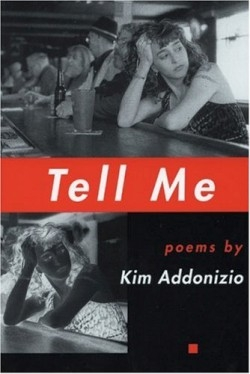Tell Me
Addonizio’s tough-girl persona winds through the late-night bars, the abusive relationships, the strip joints, cigarettes, and discarded clothing of Tell Me with an exquisite world-weariness, and even the poems are crafted using the techniques of repetition. Pantoums and anaphoras enforce the sense that this life continues night after night, unchanging: “You turn away. I remember again/ the first time you turned toward me,/ knocking over your glass./ We sat at a table, getting drunk.// The first time you turned toward me/ I knew this moment would come:/ two people getting drunk at a table,/ getting it over with. And though// I knew this moment would come/ I couldn’t help kissing you” This excerpt from “Spill” could work as a précis for a book that mourns even as it celebrates self-destructive desire and its addictive thrall.
The spiraling inward of the search Addonizio documents nearly always collapses into pain, perhaps too predictably; the poems succeed best when a twist subverts the sentimental or the clichéd. The protagonist of “Luck” watches disaster after disaster occur to other families, other friends, avoiding her with such regularity that she realizes “if your luck holds, really holds, you’ll end up completely alone.” “What Do Women Want?” asks Freud in the title of a poem, and the answer comes quickly, circularly: a cheap red dress “to confirm/ your worst fears about me,/ to show you how little I care about you/ or anything except what/ I want.” A tight sonnet, “Therapy” riffles through the details of a terrifying childhood as if the speaker were all too familiar with their recitation, ending “It’s too/ ridiculous, this ordering the noise/ the past makes into music. What’s it for?/ Time’s up. You’re in the house. I’m out the door.”
Snappy and cynical, the poet’s voice navigates its noir world with something like ease, documenting the human refusal to settle for less than enough.
Reviewed by
Janet Holmes
Disclosure: This article is not an endorsement, but a review. The publisher of this book provided free copies of the book to have their book reviewed by a professional reviewer. No fee was paid by the publisher for this review. Foreword Reviews only recommends books that we love. Foreword Magazine, Inc. is disclosing this in accordance with the Federal Trade Commission’s 16 CFR, Part 255.

